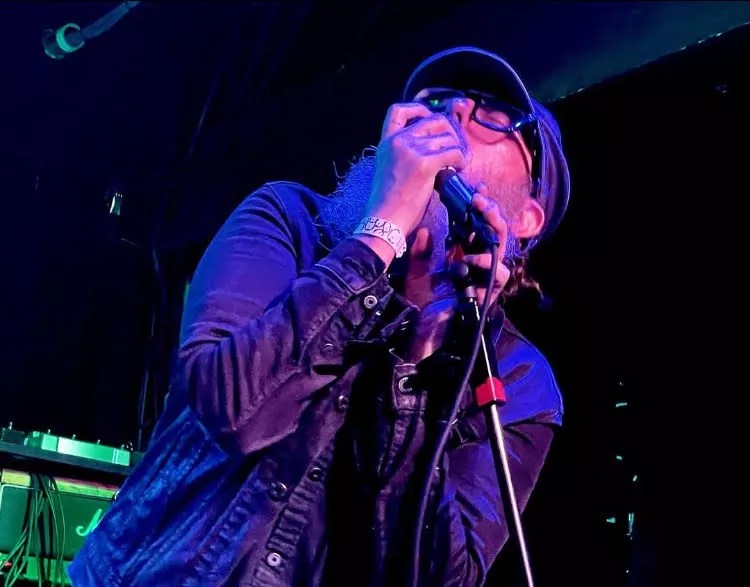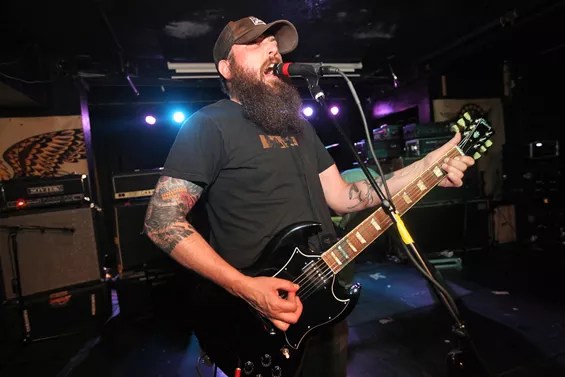
Robert Drew Burleson

Audio By Carbonatix
“FID RIP.” You’ll see that pair of acronyms a lot when reading the many online tributes to Denver musician Luke Fairchild that have been posted since his death on January 1. The cause was complications arising from diabetes, and he was 49, just four days shy of his fiftieth birthday.
“RIP” is self-explanatory, of course. But it helps to have known Luke personally if you want to decipher “FID.” It stands for “Fuck it, dude” – and if you ever spent any time around him, you can’t help but hear those three words in his unforgettable voice.
Luke’s voice was his art. As the lead singer, and usually the guitarist, of numerous local bands over the past thirty years – most recently Quits and Planes Mistaken for Stars side project Git Some – he roared and howled in a way that seemed to damage his insides more than anything outside of him. He was an astounding guitarist, too, a guy who could force-feed post-punk to stoner metal in a weird way that made you wonder how those styles were ever different in the first place.
If you’d ever tried to tell him that the music he made was art, though, he likely would have shoulder-checked you, cackled like a deranged old man, and said, “Fuck it, dude.”
I first got to know Luke in Denver’s mid-’90s punk scene. He and I were always at the same shows in the same warehouses, trying to find the same catharsis. When Angel Hair, the legendary Boulder post-hardcore band, broke up in 1995, Luke immediately formed a new group called Why Planes Go Down with one of Angel Hair’s guitarists, Andy Arahood. They were unsettling as fuck. It may seem trite today for a band called Why Planes Go Down to show actual footage of gruesome airline crashes on a bunch of staticky, black-and-white TVs on stage. But at the time, yeah, it was powerful.
But not as powerful as Luke’s voice. As the years went by, his bands would vary in texture, but never in intensity. Luke had only one setting: blastoff. Sparkles, White Dynamite, Mako 1972, Kingdom of Magic: Luke was never in a band that was anything less than pulverizing. Granted, in later years he did begin to experiment with an eerie, vibrato-laden croon. But it only made his screaming that much more devastating, to the point where it could even eclipse the inhuman writhing and contorting that he put his body through while performing.
Luke was a lovable, infuriating, complex guy. Born Lucius Armond Fairchild in 1974, he grew up in the rural Eastern Plains town of Peetz, Colorado, three miles from the Nebraska border. The population of Peetz was 175 when he was born; it has swelled to a whopping 213 today. His mother was the mayor of Peetz, and her big success while in office was paving the town’s Main Street. His father was a Black Sabbath-loving wheat farmer who was murdered while being robbed of his motorcycle.
Punk rock was Luke’s escape from small-town doom. In 1989, he moved to Denver and started going to shows, dicking around in go-nowhere bands and becoming a friendly, familiar face around town. He was deadly funny. Self-deprecating to the point of self-flagellating, he eventually funneled his dark, sick sense of humor into his music. He had tons of problems, PTSD and substance abuse among them. But he was always open and vulnerable about his struggles, even when most people in the scene weren’t that open – or that prepared to hear him.

Kingdom of Magic was one of Luke Fairchild’s most ferocious bands.
Westword
Luke was a jester at the bar who transformed into a lord on stage. He was a warm friend, a frustrating friend and often an impossible friend – but always a friend. He would not let you go, no matter what. In the same way, he would cling to his microphone stand while puking shreds of his soul into the sour air of a dive bar.
When I heard the news of Luke’s death, one memory jumped to my mind. A few years ago, he and I were fighting about some stupid, old-friend bullshit that would be embarrassing to try to explain. One morning, after basically telling him to fuck off for life, I woke up and went to my car. And I saw something taped to my windshield.
It was the insert card from an old cassette copy of The Smiths’ Meat Is Murder. There was no note or explanation. But of course, I knew it was Luke who had put it there, sneaking over to my place sometime in the middle of the night. Only he and I will ever know why he chose that particular Smiths tape – again, embarrassing – but that was his way of apologizing.
In the end, though, Luke’s music is what he will be most remembered for. Every band kicked righteous ass. He’s inspired more local musicians than he could have ever realized – or that he would have ever admitted to. He used his prickly voice to puncture himself while jabbing back at the absurd, idiotic world he constantly found himself lost in. And somehow, he turned that into a perversely joyous act. You know, fuck it, dude.
A memorial for Luke Fairchild will be held Sunday, April 6, at the hi-dive, 7 South Broadway. For details, visit hi-dive.com.